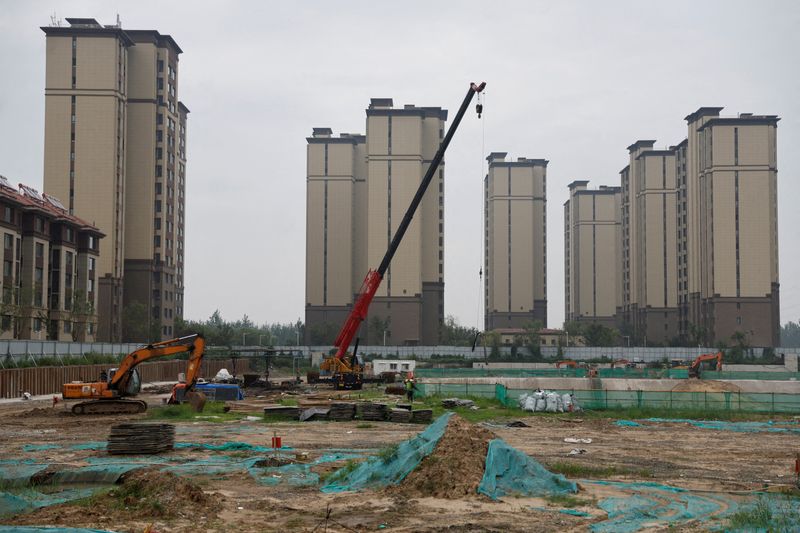Sunac, Country Garden debt deals bring respite for China’s property sector
2023.09.19 03:09

© Reuters. FILE PHOTO: A construction site of residential buildings by Chinese developer Country Garden is pictured in Tianjin, China August 18, 2023. REUTERS/Tingshu Wang/File Photo
2/2
HONG KONG (Reuters) – Chinese developers Sunac and Country Garden brought some relief to the crisis-hit property sector by forging debt deals with creditors, but the outlook remained clouded by uncertainty about a recovery in home sales.
Shares in Sunac China Holdings surged as much as 14% in early trade on Tuesday after creditors approved its $9 billion offshore debt restructuring plan, the first green light of such a debt overhaul by a major Chinese developer.
The stock, however, gave all its gains later and dropped more than 7% in the afternoon trade after reports, citing court documents, showed Sunac has filed for U.S. bankruptcy protection under Chapter 15.
Under the U.S. bankruptcy code, the move shields non-U.S. companies that are undergoing restructurings from creditors that hope to sue them or tie up assets in the United States. The step is seen as procedural in large offshore debt revamp processes.
China Evergrande (HK:) Group, which is seeking to restructure a total of $31.7 billion in one of the largest such exercises in the world, also sought protection under Chapter 15 last month.
TROUBLED SECTOR
Separately, cash-starved Country Garden won approval from creditors to extend repayment on another onshore bond, the last in the batch of eight bonds it has been seeking extensions for, two sources familiar with the matter said on Tuesday.
The developments come as Beijing steps up efforts to revive the property sector, which accounts for roughly a quarter of the world’s second-largest economy, with a raft of support measures unveiled over the last few weeks.
Sunac said late on Monday that creditors holding 98.3% of the total value of the bonds who attended the vote had approved the restructuring plan proposed and agreed to by some creditors in March.
The developer will seek approval of the plan by a Hong Kong court at a hearing scheduled for Oct. 5.
As part of the restructuring terms, a portion of its debt would be exchanged into convertible bonds backed by its Hong Kong-listed shares along with new notes with maturities of between two and nine years.
“I will treat it as a positive … We haven’t seen much progress on the offshore market, so this shows at least some Chinese developers are trying to reach an agreement,” said Gary Ng, senior economist at Natixis Corporate and Investment Bank.
If the plan could be implemented well, and depending on whether the recovery of China’s property market could generate sufficient cash flows, investors would be able to get something back, he added.
PROPERTY SECTOR OUTLOOK
While Sunac is among a string of Chinese developers that have defaulted on their offshore debt obligations since an unprecedented liquidity crisis hit the property sector in 2021, Country Garden has not missed any offshore payments yet.
The latest debt agreements with creditors will give some breathing room to Chinese developers and help them avoid default or a messy liquidation process, but the success of the agreements will depend on a recovery in the property sector.
Some offshore bondholders say they don’t have many options apart from agreeing to debt restructuring proposals, given their returns will likely be very low if they choose to liquidate a cash-strapped developer.
Even as Beijing implements measures to prop up the sector, house prices have continued to decline – latest data show new home prices fell at their fastest pace in 10 months in August, while falls in real estate investment and sales deepened.
ANZ Senior China Economist Betty Wang said the support measures could spur some “genuine demand” especially ahead of the traditional sale season during late September/early October in top-tier cities.
“However, the pace and the extent of such a turnaround will be much smaller than in previous cycles,” she said in a report published on Tuesday.
“It’s also questionable whether it will kick off a sustainable rebound especially considering the uncertain job outlook, deteriorating income inflows, a shift in expectations, and potential increase in housing supply in the long-term.”








